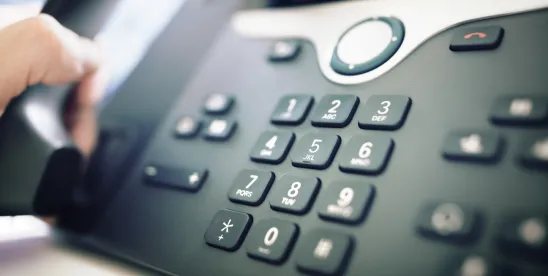This one is really incredible folks.
A big firm partner just got his law firm sanctioned by calling a TCPA Plaintiff in a putative class action in the hopes of proving someone else actually owned and used the phone line.
Talk about a bad day at the office.
Setting the stage here—TCPA plaintiffs often sue callers for purported wrong number calls when they (the Plaintiff) actually set up the lawsuit by allowing someone else to use the phone, enter the number, or otherwise have a relationship with a third party that the caller was trying to reach. Its dirty unethical stuff, and it happens all the time.
Defense counsel constantly look for tactics to try to detect and reveal this unsavory behavior to the court. But the one thing most defense lawyers know not to do is to call the Plaintiff’s phone number in an effort to somehow prove that someone else actually uses the phone.
There is a very clear ethical rule that forbids lawyers from talking to represented opposing parties about the substance of the case. This is a big clear bright line that any lawyer that passed their ethics exam has seared into their memory.
And while dialing a number in the first instance might not—in and of itself—violate the rule, having a discussion (even a brief one) with a represented party is a huge no no.
Want proof?
In Moore v. Club Exploria, LLC, Case No. 19-cv-2504, 2021 U.S. Dist. LEXIS 13741 (N.D. Ill. January 26, 2021) a partner at a 700 attorney outfit decided to call a TCPA Plaintiff’s phone number and got himself shellacked by a magistrate judge for it.
The attorney claimed he called the number looking for a Don Jorgensen who (in the defense theory of the case) owned the phone number. The problem, of course, is that the Plaintiff had taken the position that the phone number belonged to him and not Jorgenson. That’s what the whole lawsuit was about.
So when the attorney called the number he asked for “Don”–hoping he would catch the “real” user of the phone. Unfortunately for him, the Plaintiff in this case apparently actually uses the phone, answered it, and advised that no one named “Don” used the number. Further, the Plaintiff actually identified himself as Moore and then trapped the big firm partner with a couple of questions—first he asked whether Don had provided the number to the attorney and the attorney said “yes.” Second, Don asked the attorney what company he was with and the attorney said he was just “an individual.”
You see where this is headed.
While the partner was probably ok simply calling the number and asking for Don (I say “probably” in a “don’t try this at home” sort of way) the magistrate judge found he knew he was speaking to a represented party once Moore identified himself.
Moreover, the MJ found that the attorney had responded in misleading fashion to Plaintiff’s two questions. The attorney was not just an “individual” –he was a partner at a big law firm that represented the defendant. And the attorney had not actually received the number directly from “Don” so much as he had received the number from his client, who was being sued by the Plaintiff.
Importantly, although nothing of substance took place on the call the Court still determined that the communication was related to the subject matter of the lawsuit—I mean the source of the phone number is pretty key, as is the ownership of the number, which is what the attorney was probing for.
As the court puts it: “The brief phone call here absolutely involved the subject of the representation.”
Here’s the court’s conclusion:
Bringing it all together, [the attorney] violated Rule 4.2 on October 27, 2020. While [the attorney] had a good faith basis to believe that Don Jorgensen could be connected with the subject phone number, the facts demonstrate that he also had reason to believe that Moore could have answered his phone call as well. [The attorney] accordingly should have proceeded with caution… Already perilously close to the line demarcating unethical conduct from permissible conduct, once on the call, [the attorney] did not introduce himself, and once he did state who he was, he did not identify himself as counsel for Club Exploria. When Moore identified himself, it is clear that conversing further would unequivocally result in a Rule 4.2 violation. Then, not only did [the attorney] respond to two questions from Moore after that point, but he also provided misleading responses about his identity and the facts surrounding his obtaining of the phone number. The Court therefore finds that a Rule 4.2 ethical violation took place on October 27, 2020 by [the attorney].
That’s pretty brutal, but it is tough to say the MJ got it wrong. As defense lawyers we all have to be extremely careful when communicating with represented parties. Taking a shot—such as by calling a number in the hopes of proving the plaintiff didn’t really use it—might be justified in some circumstances but man oh man is it risky. And, as Moore demonstrates, proceeding with a call—even briefly—once you are informed that a represented Plaintiff answered the phone is not going to go well.
So with an ethical violation established in Moore that just leaves the question of remedy.
Plaintiff asked to have the attorney’s law firm disqualified from representing the Defendant but the Court felt that was too harsh a penalty. Instead the firm was ordered to pay the cost of Plaintiff’s motion work to address the ethical violation.
The amount of the sanction isn’t specified in the ruling, but it will likely be a five figure liability on firm’s books to start the new year. Ouch.
Stay safe (and ethical) TCPAWorld.




 />i
/>i

